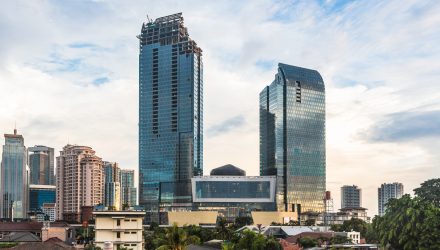The U.S.-China trade war is obviously the big trigger event that could help or hurt emerging markets, but under a microscope, the whole EM space has its own geopolitical issues, which could keep investor capital within the safe confines of developed markets.
“One could throw a dart at a map of emerging markets these days and be almost assured of hitting a country in the grips of some sort of political crisis,” wrote Robert Burgess in Bloomberg. “The list includes, but is certainly not limited to, Hong Kong, Turkey, South Africa, Chile, Lebanon and Ecuador. And yet emerging-market stocks, bonds and currencies are among the hottest assets in financial markets, signaling that investors may be sensing an upturn in the global economy.”
2018 saw emerging markets experience one of their worst-performing years and things looked like they could turn around for the better in early 2019 until more trade war news hit in the summer. In the short term, however, EM has been performing better.
“The MSCI EM Index of equities rose on Tuesday for the eighth time in the past nine trading days, reaching its highest level since July. A sister gauge has risen in seven of those past nine days, reaching its highest since the start of August,” Burgess noted. “At about 3.30 percentage points, yields on bonds from developing nations are at about their lowest of the year relative to U.S. Treasuries.”
Before an investors deep-dives into EM, he or she must understand that the market can tend to experience volatility that should be relegated to those with a cast iron stomach.
“Emerging markets are prone to wild swings, so maybe this month’s renaissance may just be a snap back from oversold levels reached in August,” Burgess noted. “But it’s hard to not be encouraged by recent developments on the global stage. As Torsten Slok, the chief economist at Deutsche Bank AG, wrote in a research note Tuesday, ‘the biggest downside risks facing the global economy have moderated.’”
Investors who sense weakness in emerging markets can look to the Direxion MSCI Developed Over Emerging Markets ETF (NYSEArca: RWDE). RWDE provides a means to not only see developed markets perform well, but a way to access a convergence/catch-up in performance of DM relative to EM, a spread that has clearly widened over the past 6 months.
The fund seeks investment results that track the MSCI EAFE IMI – Emerging Markets IMI 150/50 Return Spread Index. The index measures the performance of a portfolio that has 150% long exposure to the MSCI EAFE IMI Index (the “Long Component”) and 50% short exposure to the MSCI Emerging Markets IMI Index (the “Short Component”).
For more relative market trends, visit our Relative Value Channel.

